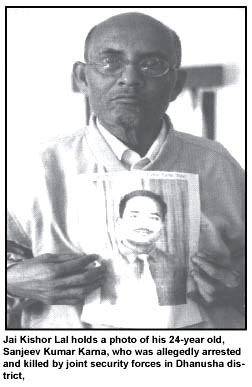As the newly-produced bill was also weak and full of
loopholes, a group of human rights organizations, including
Accountability Watch Committee (AWC), Advocacy Forum (AF), Amnesty
International (AI), Asian Federation Against Involuntary Disappearances
(AFAD), Human Rights Watch (HRW), International Center for Transitional
Justice (ICTJ), International Commission of Jurists (ICJ) and Informal
Sector Service Center (INSEC) submitted a joint memorandum to Peace
Minister Rakam Chemjong regarding some critical amendments to be made in
the latest draft bill on the formation of a commission on disappearance
at the latter’s ministerial residence at Harihar Bhawan, Pulchowk, in
the early hours of the morning on 30 August 2009. The memo submission
event was timed to coincide with the International Day of the
Disappeared.
To make the legislation on disappearance in line with
the Supreme Court verdict of 1 July 2007 and relevant international
standards, the memo stressed on a host of amendments including: .
Defining ‘enforced disappearance’ consistently with the internationally
recognized definition and recognizing that, under some circumstances,
the act of enforced disappearance amounts to a crime against humanity;
• Defining the modes of individual criminal liability,
including responsibility of superiors and subordinates, consistently
with internationally accepted legal standards;
• Establishing a minimum and a maximum penalty for the crime
of enforced disappearance as such and for the crime of enforced
disappearance as a crime against humanity;
• Ensuring the independence, impartiality and competence of
the Commission of Inquiry into enforced disappearances;
• Ensuring that the Commission of Inquiry into enforced
disappearances is granted the powers and means to be able to effectively
fulfill its mandate;
• Ensuring that all aspects of the work of the
Commission of Inquiry into enforced disappearances respect, protect and
promote the rights of victims, witnesses and alleged perpetrators;
• Ensuring that the recommendations of the Commission of
Inquiry are made public and implemented.
 Following
the submission, the Peace Ministry acted promptly and incorporated some
of the suggestions put forward by the human rights organizations. The
ministry also convened a consultation with human rights organizations to
discuss the new bill. During the discussions, the issue of "definition,"
"statutory limits" and "implementation of the commission’s
recommendations" featured significantly. Questions were raised why the
government is hesitating to define "disappearances" in line with the
article of the 2006 UN Convention For the Protection of All Persons from
Enforced Disappearance and the article 7(2) (i) of the Rome Statute of
the International Criminal Court as suggested by the rights
organizations in their memorandum. Similarly, there was much uproar visà-
vis the statutes of limitation as the new revised bill also failed to
regard "disappearance" as a continuing crime. Also the discussions
focused on ensuring the effective implementation of the recommendations
of the commission, in the absence of which the entire process would turn
out to be a sheer anticlimax. The representatives of the Peace Ministry
assured that they would make the necessary changes as suggested by the
participants but were yet to produce the re-revised bill.
Following
the submission, the Peace Ministry acted promptly and incorporated some
of the suggestions put forward by the human rights organizations. The
ministry also convened a consultation with human rights organizations to
discuss the new bill. During the discussions, the issue of "definition,"
"statutory limits" and "implementation of the commission’s
recommendations" featured significantly. Questions were raised why the
government is hesitating to define "disappearances" in line with the
article of the 2006 UN Convention For the Protection of All Persons from
Enforced Disappearance and the article 7(2) (i) of the Rome Statute of
the International Criminal Court as suggested by the rights
organizations in their memorandum. Similarly, there was much uproar visà-
vis the statutes of limitation as the new revised bill also failed to
regard "disappearance" as a continuing crime. Also the discussions
focused on ensuring the effective implementation of the recommendations
of the commission, in the absence of which the entire process would turn
out to be a sheer anticlimax. The representatives of the Peace Ministry
assured that they would make the necessary changes as suggested by the
participants but were yet to produce the re-revised bill.
The family members of the victims and the human
rights defenders all still waiting with their finger crossed for
possible developments regarding the formation of the commission. Like
the victims who are wading through the mire of injustice and state
indifference with hope against hope for justice, redress and reunion
with their loved ones, we, the human rights advocates, despite endless
frustrations and unforeseen impediments, are marching forward with a
torch of justice in our hand resounding the glossed-up dictum that
"Droit Ne Poet Pas Morier et disparaître" (RightsCannot Die &
Disappear).

______________________________
1 The Supreme Court’s verdict held
that that the existing legal framework related to commissions of inquiry
is inadequate to address the cases of disappearance that were
systematically practiced during the armed conflict in Nepal. The order
gave directives to the interim Government to introduce a new legislation
to ensure the establishment of a credible, competent, impartial and
fully independent commission. The order also stated that, in doing so,
the Interim Government should take into account the Convention for the
Protection of All Persons from Enforced Disappearance and the criteria
for Commissions of Inquiry developed by the United Nations Office of
High Commissioner for Human Rights.
Dhiraj
Kumar Pokhel. A human rights advocate, Dhiraj works as focal person
of Advocacy Forum-Nepal for the AFAD.